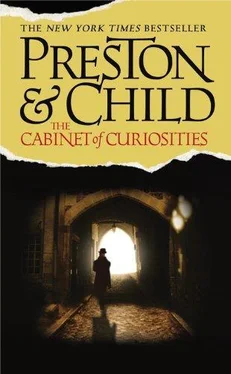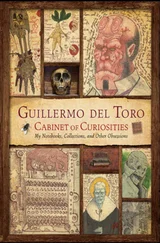Douglas Preston - The Cabinet of Curiosities
Здесь есть возможность читать онлайн «Douglas Preston - The Cabinet of Curiosities» весь текст электронной книги совершенно бесплатно (целиком полную версию без сокращений). В некоторых случаях можно слушать аудио, скачать через торрент в формате fb2 и присутствует краткое содержание. Жанр: Триллер, на английском языке. Описание произведения, (предисловие) а так же отзывы посетителей доступны на портале библиотеки ЛибКат.
- Название:The Cabinet of Curiosities
- Автор:
- Жанр:
- Год:неизвестен
- ISBN:нет данных
- Рейтинг книги:3 / 5. Голосов: 1
-
Избранное:Добавить в избранное
- Отзывы:
-
Ваша оценка:
- 60
- 1
- 2
- 3
- 4
- 5
The Cabinet of Curiosities: краткое содержание, описание и аннотация
Предлагаем к чтению аннотацию, описание, краткое содержание или предисловие (зависит от того, что написал сам автор книги «The Cabinet of Curiosities»). Если вы не нашли необходимую информацию о книге — напишите в комментариях, мы постараемся отыскать её.
The Cabinet of Curiosities — читать онлайн бесплатно полную книгу (весь текст) целиком
Ниже представлен текст книги, разбитый по страницам. Система сохранения места последней прочитанной страницы, позволяет с удобством читать онлайн бесплатно книгу «The Cabinet of Curiosities», без необходимости каждый раз заново искать на чём Вы остановились. Поставьте закладку, и сможете в любой момент перейти на страницу, на которой закончили чтение.
Интервал:
Закладка:
If he wanted to learn anything more, he’d have to get inside.
What could the harm be? The house had clearly been deserted for decades. It was probably city property now, public property. He’d come this far, done this much. If he left now, he’d have to start all over again. The image of his editor’s face, shaking a fistful of copy, eyes popping with anger, filled his mind. If he was going to charge them for the shoes, he better have something to show for it.
He tried the window, and, as expected, found it locked — or, perhaps, frozen shut with age. He experienced a moment of indecision, looked around again. The thought of clambering back down the wall was even less pleasant than climbing up had been. What he could see from the window told him nothing. He had to find a way in — just for the briefest look. He sure as hell couldn’t stay on the ledge forever. If anyone happened by and saw him…
And then he spotted the cop car a few blocks south on Riverside Drive, cruising slowly north. It would not be good at all if they caught sight of him up here — and he had no way to get down in time.
Quickly, he pulled off his jacket, stuffed it into a ball, and placed it against one of the lowest of the large panes. Using his shoulder, he pressed until it gave with a sharp crack. He pried out the pieces of glass, laid them on the ledge, and crawled through.
Inside the room, he stood up and peered through the window. All was calm; his entry hadn’t been noticed. Then he turned around, listening intently. Silence. He sniffed the air. It smelled, not unpleasantly, of old wallpaper and dust — it was not the stale air he’d been expecting. He took a few deep breaths.
Think of the story. Think of the Pulitzer. Think of Nora. He would do a quick reconnaissance and then get out.
He waited, allowing his eyes to adjust to the dimness. There was a shelf in the back, and a single book lay on it. Smithback walked over and picked it up. It was an old nineteenth-century treatise titled Mollusca, with a gold engraving of a conch on the cover. Smithback felt a slight quickening of his heart: a natural history book. He opened it, hoping to find a bookplate reading Ex Libris Enoch Leng. But there was nothing. He flipped the pages, looking for notes, then put the book back.
Nothing else for it: time to explore the house.
He carefully removed his shoes, placed them by the window, and proceeded in stockinged feet. With careful steps he made his way to the closed door. The floor creaked, and he stopped. But the profound silence remained. It was unlikely that anyone would be in the house — it looked like even the junkies and bums had been successfully kept out — but caution would be wise nonetheless.
He placed his hand on the doorknob, turned it ever so slowly, eased the door open an inch. He peered through the crack. Blackness. He pushed it wider, allowing the dim morning light from the window behind him to spill into the hallway. He saw that it was very long, quite grand, with flocked wallpaper in a heavy green design. On the walls, in gilded alcoves, were paintings draped with white sheets. The sheets clung to the heavy frames. At the far end of the hall, a broad set of marble stairs swept downward, disappearing into a pool of deeper darkness. At the top of the stairs stood something — a statue, perhaps? — draped in yet another white sheet.
Smithback held his breath. It really did look as if the house had been shut up and deserted since Leng’s death. It was fantastic. Could all this stuff be Leng’s?
He ventured a few steps down the hall. As he did so, the smell of mold and dust became suffused with something less pleasant: something organic, sweet, decayed. It was as if the rotten old heart of the house had finally died.
Perhaps his suspicions were right, and Leng had entombed the bodies of his victims behind the heavy Victorian wallpaper.
He paused, an arm’s length from one of the paintings. Curious, he reached out, took the corner of the white sheet, and lifted. The rotting sheet fell away in a cloud of dust and tatters, and he stepped back, momentarily startled. A dark painting stood revealed. Smithback peered closer. It depicted a pack of wolves ripping apart a deer in a deep wood. It was ghoulish in its anatomical detail, but beautifully executed nevertheless, and no doubt worth a fortune. Curiosity aroused, Smithback stepped to the next alcove and plucked at the sheet, which also turned to powder at his touch. This painting showed a whale hunt — a great sperm whale, draped with harpoon lines, thrashing about in its death throes, a huge jet of bright arterial blood rising from its spouter, while its flukes dashed a boatful of harpooners into the sea.
Smithback could hardly believe his luck. He had struck paydirt. But then, it wasn’t luck: it was the result of hard work and careful research. Even Pendergast hadn’t yet figured out where Leng lived. This would redeem his job at the Times, maybe even redeem his relationship with Nora. Because he was sure that — whatever information about Leng Nora and Pendergast were looking for — it was here.
Smithback waited, listening intently, but there were no sounds from below. He moved down the carpeted hallway in slow, small, noiseless steps. Reaching the covered statue at the top of the banister, he reached up and grasped at the sheet. As rotten as the others, it fell apart, dropping to the ground in a dissolving heap. A cloud of dust, dry rot, and mold billowed up into the air.
At first Smithback felt a frisson of fear and incomprehension at the sight, until his mind began to understand just what he was looking at. It was, in fact, nothing more than a stuffed chimpanzee, hanging from a tree branch. Moths and rats had chewed away most of the face, leaving pits and holes that went down to brown bone. The lips were gone as well, giving the chimpanzee the agonized grin of a mummy. One ear hung by a thread of dried flesh, and even as Smithback watched it fell to the ground with a soft thud. One of the chimp’s hands was holding a wax fruit; the other was clutching its stomach, as if in pain. Only the beady glass eyes looked fresh, and they stared at Smithback with maniacal intensity.
Smithback felt his heart quicken. Leng had, after all, been a taxonomist, collector, and member of the Lyceum. Did he, like McFadden and the rest, also have a collection, a so-called cabinet of curiosities? Was this decayed chimp part of his collection?
He again experienced a moment of indecision. Should he leave now?
Taking a step back from the chimpanzee, he peered down the staircase. There was no light except what little filtered in from behind nailed boards and wooden shutters. Gradually, he began to make out the dim outlines of what seemed to be a reception hall, complete with parqueted oak floor. Lying across it were exotic skins — zebra, lion, tiger, oryx, cougar. Ranged about were a number of dark objects, also draped in white sheets. The paneled walls were lined with old cabinets, covered with rippled glass doors. On them sat a number of shadowy objects in display cases, each with a brass plate affixed below it.
Yes, it was a collection — Enoch Leng’s collection.
Smithback stood, clutching the upper knob of the banister. Despite the fact that nothing seemed to have been touched in the house for a hundred years, he could feel, deep in his gut, that the house hadn’t been empty all this time. It looked, somehow, tended. It bespoke the presence of a caretaker. He should turn around now and get out.
But the silence was profound, and he hesitated. The collections below were worth a brief look. The interior of this house and its collections would play a big role in his article. He would go down for a moment — just a moment — to see what lay beneath some of the sheets. He took a careful step, and then another… and then he heard a soft click behind him. He spun around, heart pounding.
Читать дальшеИнтервал:
Закладка:
Похожие книги на «The Cabinet of Curiosities»
Представляем Вашему вниманию похожие книги на «The Cabinet of Curiosities» списком для выбора. Мы отобрали схожую по названию и смыслу литературу в надежде предоставить читателям больше вариантов отыскать новые, интересные, ещё непрочитанные произведения.
Обсуждение, отзывы о книге «The Cabinet of Curiosities» и просто собственные мнения читателей. Оставьте ваши комментарии, напишите, что Вы думаете о произведении, его смысле или главных героях. Укажите что конкретно понравилось, а что нет, и почему Вы так считаете.










